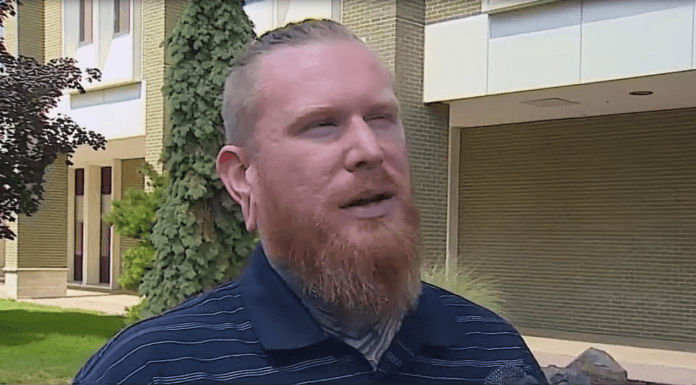(Ken Silva, Headline USA) Last month, Brandon Caserta was hired for his first job in more than two years.
A skilled computer numerical control machinist, Caserta’s unemployment spell wasn’t for a lack of trying. Rather, the former Michigan resident was one of 14 men arrested in October 2020 over an alleged conspiracy to capture the state’s governor, Gretchen Whitmer.
With at least 12 undercover informants involved in the U.S. government’s investigation into the alleged Whitmer kidnapping plot, critics have characterized the case as an FBI entrapment operation.
Those critics point to the informants having organized meetings, provided the defendants with transportation and supplies, and fueled them with drugs and alcohol before brainstorming about how to capture Whitmer—along with a slew of other misconduct by the FBI.
But in Caserta’s case, entrapment—which entails law enforcement enticing people to commit crimes—is a slight misnomer. Caserta wasn’t even entrapped into doing anything; he was just plain innocent.
Caserta said he became acquainted with some of his co-defendants during the lockdowns, civil unrest and economic uncertainty of mid-2020.
Seeking like-minded people to conduct survivalist training with, Caserta accepted an invitation from Wolverine Watchmen member Joe Morrison to shoot firearms at his property. Caserta never joined the Watchmen, and he met them only once or twice a month over a four-month span before he was arrested in October 2020, he said.
“Government had a timeline of events—when phone calls were made and certain events happened—and there’s probably 130 to 140 of these,” Caserta told Headline USA in an exclusive interview. “I marked how many of these events involved me, and it was about six.”
Caserta said he thinks the government targeted him due to his outspoken anti-government beliefs and inflammatory statements he made to the alleged co-conspirators on encrypted chat platforms.
“All they did was play statements that people could consider offensive,” Caserta said. “Me and my lawyer understood that: You might have said this nasty thing, but there wasn’t any agreement to kidnap the governor.”
A federal jury agreed with Caserta in April, finding him not guilty of the conspiracy charge, which could have landed him in prison for the rest of his life.
But while he regained his freedom, the not-guilty verdict was just the first step in Caserta trying to piece his life back together.
Moving to Kentucky to put the Michigan ordeal behind him, Caserta said he was completely broke. Family let him live with them, but told him he’d have to find a job soon.
“I’m lucky enough to where I have a good family and they love me, so they’re essentially like, ‘You can live here, but you gotta get to work ASAP because we can’t afford to feed your ass,’” he said.
That proved more difficult than he expected. For months, Caserta applied for jobs, only to be “ghosted” when the potential employer Googled him, he said.
“What I kept running into was getting interviews with recruiters on Indeed, who told me I had a good resume and that a machine shop down the street could absolutely use me,” he said.
“Well, what wound up happening is every time I got really close to being hired, they’d ask me about my work gap,” he continued. “I can’t lie on my application. I don’t tell them the details, but I tell them I was charged with something, I had to spend some time in jail, but I took it to trial and won.”
The frustration many job-hunters face in dead-end situations was made that much worse by the hyperpartisan political climate and the re-victimization he faced as a falsely accused defendant confronted by the pernicious realities of cancel culture.
“They would say it’s no big deal, but then they’d ghost me,” Caserta said. “And what would happen is they’d look me up, realize who I was, and then just never call me back.”
Transportation was another issue with Caserta, who said the FBI damaged his vehicle when he was arrested.
“When the FBI searched it, they tore it apart,” he said of his 1999 Chrysler LHS, which he bought from his neighbor a few years ago for $500. “I think they did something to the motor, too, because it’s running different.”
Finally, Caserta received a job offer last month at a machine shop in Kentucky. Thrilled, he felt like he “hit the lotto.”
“Starting off at $26 and hour and moving up to $27 an hour after two months,” he said.
Most of Caserta’s co-defendants haven’t been as lucky. While Dan Harris was also acquitted, Barry Croft and Adam Fox were found guilty in their August retrial.
Three defendants in a separate state case were also found guilty of supplying “material support” for a terrorist act last month.
“None of them should be facing this,” Caserta lamented, adding that he will continue to speak truth to power as he sees it.
“My main goal now is to network with as many people I can and: One, find an attorney who’s willing to sue the feds for what they did to me; but also to eventually get up a platform—to have someone else in the freedom community who’s speaking truth.”
A GiveSendGo crowdfunding page in his name had garnered nearly 50 supporters as of Thursday. Those wishing to help can visit: https://www.givesendgo.com/kinetictruth.

